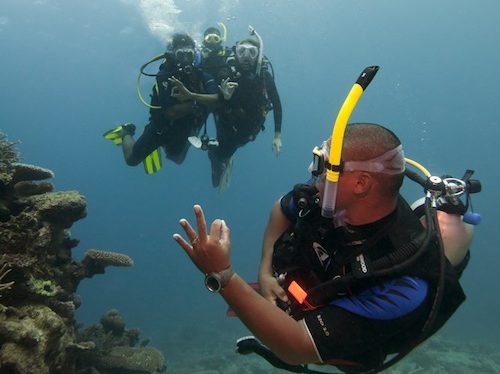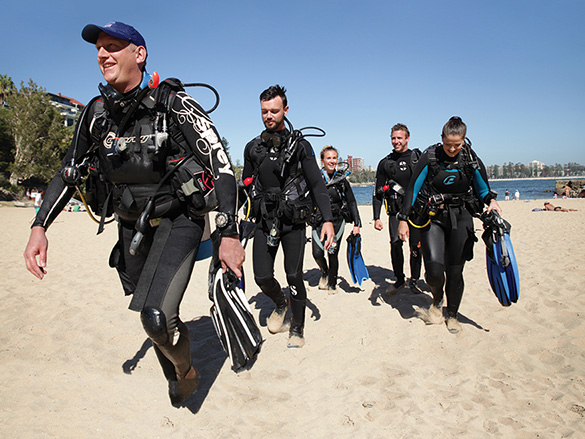Choosing the right PADI Divemaster Course
So you’re thinking about doing your Divemaster Course? Congratulations – that’s a big step forward!
There are a lot of options and choices out there.
Not everyone has the same learning needs and time restraints, but is one course structure or course length better than any other?
We’re here to simplify things, so you can choose the right divemaster course for you. Ask any Instructors and Divemasters and they’ll all have a strong opinion on where to do your course, how long it should take, and whether you should do an internship or not. Much of this is based on their own personal experiences – both good and bad, but there are as many opinions as there are PADI professionals.

How long should a course take?
According to the PADI Instructor Manual, the Divemaster Course should take around 50 hours of teaching. At 5 hours a day, that would only take 10 days!
The Divemaster Course is not just about being taught – although that is obviously a part of it – it’s about becoming a Dive Professional. It’s about taking the time to practice to achieve mastery.
On our Divemaster Course we take 6 weeks. It’s a fairly standard length for a Divemaster Course, and it gives our Divemaster trainees plenty of practice at briefing and leading dives. Some courses are 4 weeks, and that is fairly intensive. Anything more than 6 weeks and you are either learning things that are not strictly part of a Divemaster Course (not necessarily a bad thing), or you are repeating tasks ‘because they are part of the job’. Lifting and filling tanks comes to mind ?

A Course that is less than 4 weeks is really only suitable for someone with a particular skill set:
- significant dive experience (150+ dives)
- buoyancy control that has gone past ‘good’ to ‘instinctive’
- career leadership experience
- customer service experience
These are qualities that every Divemaster Trainee has to learn and they take time. If you don’t have those skills and experience yet, then you need to choose a Divemaster Course of at least 4 weeks to give you time to learn and practice them.
Where should you do your Divemaster Course?
This is one point that there is almost universal agreement on. You should try to do your Divemaster Training where you want to work. Because every area has specific needs and skills:

- In the Mediterranean there are lots of ‘try-dives’
- West coast of Thailand has liveaboard boats with all dive groups being led by a Dive Professional
- In Egypt the liveaboards have Dive Professionals who supervise from the boat, and don’t normally enter the water
- Cold Water dives require drysuits and steel tanks
- Warm Water dives have thin suits and aluminium tanks
Do your homework and find the area that you would like to work in. Then start researching the Dive shops in that area. Don’t get swayed too much by the price – generally, you get what you pay for.
Obviously some areas are cheaper than others. If the local diving in that area is all shore diving then your course will be cheaper than in an area where all the dives are done on liveaboards.
If a course is particularly cheap or expensive for the area that you are looking at, find out why. Are they offering extras that you are interested in?
Read reviews – Facebook, Google, Tripadvisor to find out what other peoples experiences were. Find out who teaches the Divemaster Courses at the dive centre(s) you’re considering – how much experience do they have? As with all scuba courses, your instructor will have the biggest influence on whether your course is awesome or awful. If at all possible, talk to the instructor who will be your mentor. Make sure that you like the way they interact with you.
To choose the right Divemaster Course you need to make sure you have all the information in front of you.
Should you choose a Divemaster Course or an Internship?
People usually consider Internships for one of 2 reasons:
- Cheaper price (sometimes even free)
- More experience
There are benefits and disadvantages to Internships, and you should understand exactly what is expected of you before you start.
Cheaper Price
Generally an Internship will offer you a cheaper price for your course and you will be expected to work for the dive centre in return. If you are travelling on a very limited budget then this can be a great way to do the Divemaster Course that perhaps you could not otherwise afford.
For many people who are taking time off work to do their course (even if that is a longer sabbatical), if you work out the saving per day of working, then you’ll probably find that you would be better off earning the money in your normal job and paying full price for the course!

Within an area, where the dive shops are all doing the same sort of dives, prices should be comparable. If one shop is a lot cheaper or a lot more expensive then you’ll need to dig a bit deeper as to why. Look for extra things included: specialties, accommodation, liveaboard trips are all things that may differentiate one dive centre from another.
Also look to see how much of the course is training and how much is working. The valuable thing that you are paying for is training. If what you are getting is hours of carrying and filling tanks every evening, then the price needs to reflect that.
More Experience
An Internship can be a great way of getting experience. If this is the reason you are considering doing an Internship, then you need to look at what experience you are going to get.

Working in a dive shop doing the same roles as other divemasters can be great. Especially if you get the opportunity to do all aspects of work in the shop.
Getting stuck in the compressor room on your own filling tanks teaches you nothing.
Taking your turn as boat master and seeing the operation from the surface as well as underwater is a great education.
Spending 2 hours every afternoon washing kit from all the returning trips (that you didn’t go on) is not.
Many people view an internship as slave labour – and it can be. It can also be the greatest 3-6 months of your life, if you picked the right dive centre.
Hopefully we’ve given you a few pointers to help you choose the right divemaster course for your needs.If you would like more information on doing your Divemaster Course or Internship in Thailand, then please contact us.
